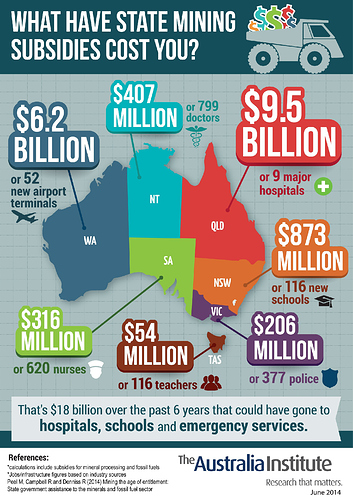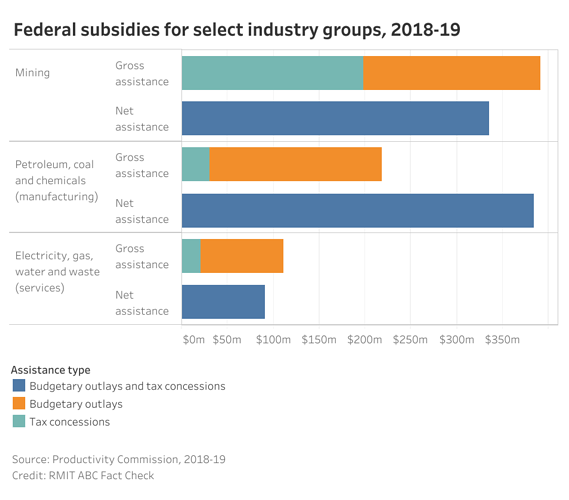I like this image:
It is worth noting that the figures prepared for The Australian Institute were estimated based on a 6 year period in the years before the report’s compilation (which was in 2014). If these numbers are robust, then annually they are about 1/6 of that shown in this figure.
To provide balance, NSW Mining (Castalia Strategic Advisrs in behalf of NSW Mining) prepared a response to The Australia Institute estimates, and this response can be found here.
It is also worth noting and looking at the other side of the ledger, that in a a Deloitte Access Economics report commissioned by MCA reveals that Australian mining companies paid $30.6 billion in company tax and royalties in 2017-18. These taxes and royalties are about ten (10) times that estimated subsidies The Australian Institute alleges that government gives the mining industry.
TAI generally do good work and Richard Denniss seems a very genuine bloke whose economic analysis is good.
In that particular paper they have thrown a blanket over anything that even looks like it might financially benefit the mining sector. In some cases this is clearly accurate, for example funding “clean coal” and rail transport deals that apply specifically to coal transport.
In other cases they are drawing a rather long bow, for example the tug fleet base at Port Kembla. It is fair to say that a major user of the port is the coal industry but is it really fair to say that general port maintenance is a subsidy for a particular industry? There are many other similar examples. I don’t doubt that the overall conclusion is correct that some States provide huge subsidies for mining, I do doubt that it is quite as large as the headline figures suggest.
When the industry so consistently exaggerates its benefits and diminishes its drawbacks the temptation to do the reverse can be overwhelming.
Whist some of these are owned by the State governments (some have been leased out to private operators), they are very much a user pays system and generate revenue for the owners/operators, including State governments.
I recall at the time that some of the media thought the mining industry was being given subsidies for the use of infrastructure and not paying the same as other users. Each particular user of the infrastructure has separate commercial agreements based on a range of factors.
Agree and in many cases the whole picture isn’t provided as each one side wants to promote own’s own agendas.
Maybe, the TAI paper is only State finances, some study of Commonwealth figures would be interesting. And what is the value of favourable legislation, regulations, assessment systems, direct support from Ministers and senior public servants and the ability to generate huge pollution with almost no consequences?
On the flip side, what is the economic and social costs through loss of the revenues (taxes, royalties, goodwill, etc) if the mining did not occur.
If we didn’t have mining then we would miss out on income?? Well yes some, but what if we had other Australian industries in other areas eg Solar, Wind, Hydro power generation and the required product and infotech industries linked to those and then selling or leasing that to the rest of the World, and then all the other sectors we could and do have involvement in what are we losing by not developing those? Maybe vastly more than we gain by our fixation on the income that simply mining and selling raw materials makes. Employment in mining well that’s falling as more automation comes into play, then there are the remediation costs often borne by taxpayers after mining ceases in an area. How does Germany fair because it isn’t mining it’s own country reliant? Very well it would seem supplying many parts of the World with their products, Japan as another who develop and refine rather than mine.
We need to be more forward thinking than a simple mining, primary production based economy that we seem to be stuck in. We are falling behind because we aren’t building future industries for a future Australia.
This isn’t to say mining is totally bad, it isn’t but if all you rely on is digging it out and selling the rock to others so they can make the batteries, cars, computers, machines etc to sell back to Australia we are easily held to ransom by the vested interests of those who buy the rocks. Nor is other primary production bad but it is if it is treated in the same way mining is…and it often is.
I am not against mining per se, our life is simply not possible without it. What troubles me is the privileged position they have secured in this country. It would be fair to say that I am against inappropriate mining and inappropriate treatment for the industry.
Compared to many other countries our royalties are low even when they are not forgiven or discounted through special deals. The people only get paid once for non-renewable resources. Other countries have found themself with windfall bonuses for the public purse from extractive industry but per ton or GJ we have got relatively little and often frittered that away.
The profits from mining are huge and the majority (about 75% last time I looked) go overseas. In the meantime those near mines pay the price in terms of reduced health and lack of amenity which could be remedied if profit margins were a bit slimmer.
The balance will never be redressed now as our governments are addicted to the way things are. Those who try to alter the balance (like Gillard) are likely to get rolled by the industry whose PR machine knows how to play to win and they are well funded. People like Denniss have been trying to show that we don’t manage mining very well but few listen and fewer will act. Bringing on comprehensive real-time disclosure of political donations at all levels might open some eyes but neither side of the aisle support that.
Agree.
It is also possible that those energy rich nations in the future will be those who also become the primary production/raw materials value adding nations. Energy will become more and more difficult to transport or cost effective to transport long distances unlike traditional fossil fuels (which is why Australia and others are developing the Australian Hydrogen Strategy). Significant amounts of energy is needed to turn rock (ore) into metal…to process foods or forestry products etc.
If a nation is energy poor and currently relies on import of energy for these value adding industries, it is likely that in the coming decades that these energy intensive industries will move to locations where energy is in abundance (either through renewables or say nuclear).
Australia may have an advantage in relation to renewable energy advantage along with other more arid nations which are typically located on or near the Tropic of Cancer/Capricorn (between the tropics and the northern/southern low pressure systems). As most of the world’s population resides outside these areas and most countries are not what would be classed as developed, Australia particularly has the opportunity to have energy intensive industries located in our energy rich areas.
One can be optimistic about the (Australia’s) future.
Its worth noting the cost to the Deaths directly related to Pollution killing Humans,Wildlife and Flora. And the many who carry sickness with them for decades eg: Black Lung,Asbestosis. The taxpayer picks up the cost and this is an unacceptable cost when KNOWN alternatives exist. Why do people argue to keep pollution going and the even more obscene Oil which has us at War since 2003 lives lost, refugees, spread of terrorism, environmental destruction?
Hi all, thanks for the discussion on fossil fuel subsidies in Australia. I think everyone had a good opportunity to have their say, so we’ve closed this thread down for now. We’ll consider reopening it at a later date if the situation warrants it.
I asked to have this thread be reopened to talk about this article in The Conversation. The Conversation is a publically funded journal mainly written by academics in their field and is not much subject to foolishness and bias. It is not supported by government funding or any specific industry.
The article is timely as we are now facing the question of how to best spend public money to re-energise the economy. Recovery will be slow but without stimulus recovery will be painfully slow. Of course the rent seekers and opportunists will all have their hands out, some money will be well spent but the risk is some will not.
Whether a financial arrangement is a subsidy depends on your definition. But the linked article points out in this country by any definition it is substantial. The Conversation (TC) refers to this International Monetary Fund paper. Which includes as subsidies where operators are not required to pay their costs. A major subsidy world wide is ignoring the cost of pollution. Largely the costs to individual people and public health of air pollution. There are many other forms of subsidies, some of which have been mentioned upthread.
From the TC article:
If we divide the IMF subsidy figure by the number of direct jobs, the governments of Australia spend A$730,000 each year for every direct job in the coal, oil and gas industry. That equates to A$1,832 for every Australian.
The jobs generated is always the first figure quoted by anybody wanting to have an action or policy approved but if you look at the people out of work now and what it will cost to get them back into work you have to ask if what we are already paying for the fossil fuel industries, that were not closed down during the pandemic, is rather high.
We already have one example of the FF industry putting their hand out that was discussed here.
Before I am challenged with being political (again) let me point out this is a matter of broad policy and the current situation is derived from many decisions, made by many governments of all persuasions, over a considerable period of time.
From ABC Fact Check:
Now that the US is back in climate change science our ‘team’ remains rusted and welded on to subsidising fossil fuels by the bait and switch, pretending carbon capture is a real treatment or possibly a solution. It is as if government only takes advice from the ExxonMobile board, miners, and of course gas companies who are supposedly leading our economy (by definition).
It quacks.
Not to mention the fowl odours and flies that come with ducks. I thought gas was supposed to be odourless and colourless. Wrong sort of gas? ![]()
Although some still do fall in love with ducks.
It is on record. Helping solar and wind is against government policy. Probably not enough LNP votes in it?
Shameless mob, yet predictable.


